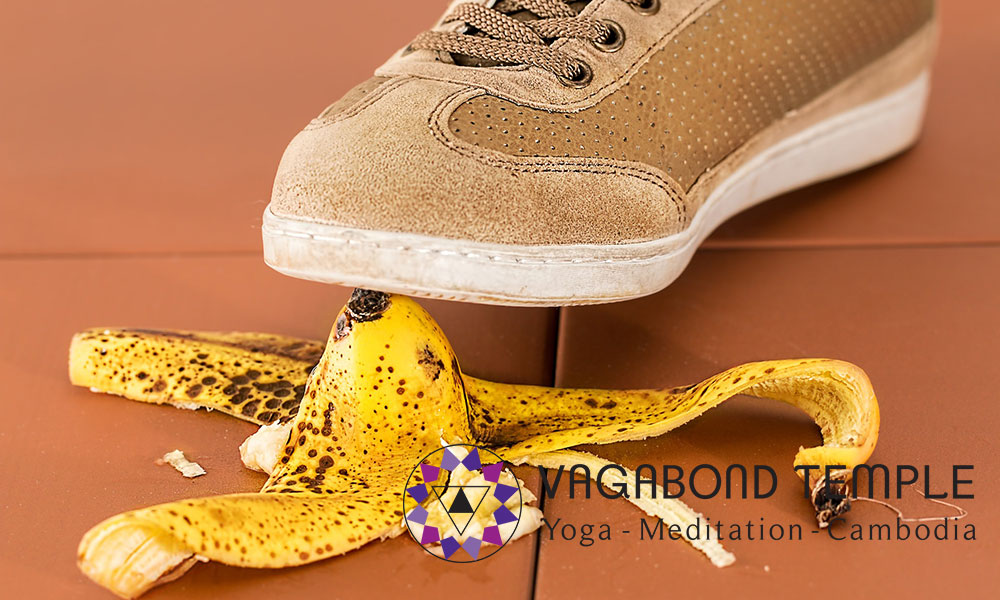Getting Kicked Out Of The Moment: The Five Hindrances

Meditation is a beautiful spiritual practice that can bring us many benefits, although it can be very challenging. When new to meditation, rather than experiencing peace or bliss, we may find ourselves faced with the unsettling realisation that we have very little control of our minds. Try to focus on your breath for an object of meditation for a few moments and you will often find your mind being pulled in all sorts of different directions. The “present moment” that we hear so much about from spiritual teachers can seem quite elusive; we may think we have finally found it when suddenly we are grabbed by a thought or emotion and unceremoniously dumped back into the turbulent sea of endless thought and emotion.
Buddhist thought explains that the various forces that pull for our attention weaken us – so rather than being free agents we are at the mercy of our minds. The aim is to free ourselves from the grip of the various tendencies that distract us, allowing us to see the world with a new clarity.
The Buddha categorised the distracting tendencies into five (known as the “Five Hindrances”). By categorising and naming these tendencies, he gave us a beautiful tool for becoming aware of them, which is the first step to freedom. For each one, he taught methods to overcome them.
The Five Hindrances are: Attachment, Ill Will, Laziness, Restlessness, and Doubt. Next time you sit in meditation you may notice some (or all!) of them popping up to distract you. Likewise in your daily life you may find these forces cloud your judgement and, in some cases, can even totally paralyse you. Learning about the hindrances will help you to anticipate and overcome them in a calm, non-dramatic way.
Attachment
Without food or water we die, without sex we go extinct – so it is no surprise that we feel strong desires. However, desire of sensual pleasure can bring us suffering. If we desire food too much, we will eat until we make ourselves sick and damage our physical health; if we think of nothing but success we may drive ourselves crazy by constantly competing with others and being harsh on ourselves – unable to ever relax. Blind pursuit of sensual pleasure can be thought of like accumulating debt: sooner or later we will have to pay it back in one way or another. There is a sense that there is never enough: the more you have, the more you need. Buddha understood that, in the end, that our attachment to pleasure ultimately takes all the joy out of it and leads to suffering. Buddhism does not advocate repressing all desires (this would be impossible) but experiencing them without attachment, as if we are watching from a neutral outsider’s perspective.
Our modern society seems to thrive on creating attachments: we are constantly bombarded with adverts and ideas of how we should be or what we should have, not very Buddhist at all!
In meditation, attachment often pulls for our attention; we may feel hunger, then daydream about food. Daydreams about all sorts of objects we would like to obtain may come up and before we know it we have been lost in thought.
1. Ill Will
This relates to anger, hatred, and resentment. If somebody has hurt us we may feel the need to take revenge. If somebody has something that we want, we can feel jealousy which can manifest in feelings of inadequacy or a desire to harm the other. Buddha viewed this hindrance as a sickness – it causes us to lose our freedom in the same way as a physical illness does – it incapacitates us.
In a meditation session, memories may come up of people who have upset us causing anger to arise. Often when this happens, thoughts go around in circles as we replay a situation over and over again, getting increasingly angry with and further and further away from that blissful present moment.
2. Laziness
“I’ll do it tomorrow”, is not one of the Buddha’s mantras. The tendency to put things off, or not do them at all, is a major obstacle for most of us. The mind may come up with a million different excuses why not to do something – however we can see they are all coming from the same lazy place! A Buddhist metaphor for this tendency is being locked in a cell: we feel trapped and unable to act.
One of the biggest obstacles to meditation or any spiritual practice is simply getting started. One you have sat on your cushion or mat you will most likely do the practice.
3. Restlessness and Worry
Sometimes the mind can be like a demanding boss who is never satisfied whatever we do. Instead of a nice walk, we may find ourselves staring at our feet worrying about something somebody said, or rushing so as not to be late.
Anybody who has laid in bed at night, wrestling with a million seemingly urgent (but ultimately pointless) thoughts has experienced this hindrance. A great metaphor commonly heard in spiritual circles as is the mind as a drunk monkey that has been stung by a scorpion – hopping around frantically, hopelessly trying to figure out what’s wrong! Restlessness and worry have become so prominent in the modern would that it seems hard to find anybody who does not feel anxious a lot of the time.
In meditation, this is often one that comes up immediately; we may feel a strong tendency to fidget or adjust our position more than is necessary, a million stray thoughts and anxieties will fight for our attention and take us away from our object of concentration.
4. Doubt
“What’s the point?” “Isn’t meditation going to just make me boring?” “Why should I bother with all this spiritual stuff? It seems a lot like hard work for no reason.” These type of doubts are common and actually quite reasonable; believing things just because a religious tradition tells you to seems like the road to fundamentalism. In Buddhism however, blind faith is not advocated at all: we are not instructed to believe anything, just invited to see for ourselves. If you accept the invitation, you will likely find the hindrance of doubt is the first one to drop away as you start to see the truth in the teachings.
When The Going Gets Tough
When big changes or challenges come up in our daily lives, one of hindrances often pop up, or sometimes they like to get together for the big group attack!
Take for example a relationship breakup, which is normally a very painful experience. Attachment is often there i.e. strongly missing the other person or trying desperately to get them back. Ill Will is also likely which can manifest as extreme anger towards the other or yourself. Restlessness & Worry can manifest in feelings of regret and shame.
A less emotionally charged example would be trying a challenging Yoga position in a class. There may be laziness “I’ll do it next time”; Restlessness, the feeling that you would rather be doing something else; Doubt, “Is it even worth trying?”.
In these type of situations the hindrances can prevent us from seeing the situation clearly, and taking the correct course of action. In Buddhism, it is said that the inability to accept the constantly changing nature of reality is what causes us to suffer – so by learning about the hindrances we can start to attempt to solve this most fundamental of problems.
Investigate Your Hindrances
In learning to overcome the hindrances, awareness is the key. Sitting in meditation will give us an idea of which of the hindrances tend to come up for us. Bringing mindfulness to everyday life will have the same effect. One exercise is to spend a day simply watching to see what comes up for you. If you are often anxious, or wishing you were somewhere else, then restlessness is an issue for you. Often find yourself blaming others and getting angry? In this case Ill Will is an issue. It is crucial to be soft and non-judgemental with yourself, all of us experience all of the hindrances, and they are not a sign there is anything wrong, in fact noticing them is a very positive thing!
It is worth remembering that there is more than one to behave in a given situation, we may have developed a habit of always doing the same thing (responding to anger by shouting at somebody, responding to laziness by staying in bed etc.) but really there are many more options!
Buddha’s Prescription
In identifying the five hindrances, Buddhism beautifully teaches us to transform our most difficult experiences into objects of awareness. This keeps us present and allows us to make the best of all situations. By simply becoming aware of the hindrances we start to weaken them as we no longer respond with panic or surprise. For each specific hindrance, advice is also given. So once you have checked up on yourself to see which ones are the most challenging for you, you may wish to try the following.
Attachment – Simply bringing your attention to your breath. Remembering the suffering that attachment can bring. Moderation in eating is also advised as it teaches us we have more control than we think over our desire for food.
Ill Will – Anything that encourages more positive thinking such as practising gratitude is advised. The “loving kindness metta meditation” is another powerful way of overcoming Ill Will.
Laziness – Again moderation in eating is recommended, and being around people who are a positive influence. The mind will always come up with excuses not to do things, laziness can be overcome by not taking them too seriously (just do it anyway!). Being in open spaces is also said to help, so if you are living in a city, spend time in the park or take a trip to the countryside.
Restlessness – The wandering mind is best trained through meditation, eventually it will find that settling on a single object (e.g. the breath) is preferable to pointless worry. Being around calm people is also beneficial as other people’s restlessness is contagious!
Doubt – Meditative practices overcome doubt as you will start to see the truth in the teachings. As with laziness, the doubting mind can be overcome if you simply notice it and proceed anyway. It is advised to study Buddhist teachings and speak with like-minded people.
If a hindrance appears during meditation it should be met softly, with detached awareness.
See our article on dealing with mental disturbances in meditation.
Try It Out
No amount of studying is a substitute for practice, so if you want to understand the five hindrances and how they could be restricting your freedom, then investigate! The importance of softness and non-judgement cannot be stressed enough, we are not trying to escape from ourselves, just to see things with a new clarity.



